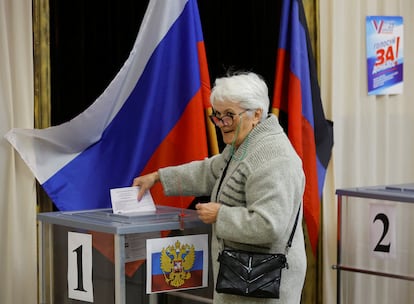Russia says ruling party wins most votes in Ukrainian regions it occupies, while West calls elections sham
Voting for Russia-installed legislatures began last week. Russian officials said the average turnout across Russia and the occupied Ukrainian regions was just over 43%

Russia’s Central Election Commission said Monday that the country’s ruling party won the most votes in elections held in occupied Ukrainian regions, as Kyiv and the West denounced the ballots as a sham. The votes were held as Russian authorities attempt to tighten their grip on territories Moscow illegally annexed a year ago and still does not fully control.
Voting for Russia-installed legislatures began last week. According to the Central Election Commission, lawmakers from the ruling party, United Russia, came out on top in the four Ukrainian regions Moscow annexed in 2022 — Donetsk, Kherson, Luhansk, and Zaporizhzhia — and on the Crimean Peninsula, which the Kremlin annexed in 2014.
Western countries have denounced the elections as a violation of international law. “We strongly reject this further futile attempt by Russia to legitimize or normalize its illegal military control and attempted annexation of parts of Ukrainian territories,” the European Commission said Monday in a statement, promising “consequences” for Russia’s leadership. On Friday, Ukraine’s Foreign Ministry urged other countries not to recognize the results of what it called “fake elections.”
The votes in the Ukrainian regions were timed to coincide with nationwide elections for local legislatures and governors across 16 Russian regions. There were also multiple votes for city and municipal councils across the country and races for a few vacant seats in the State Duma, Russia’s lower house of parliament.
In Moscow, United Russia received the most votes, returning Sergei Sobyanin as mayor. He won against candidates from other Kremlin-backed parties with more than 76% of the vote, according to the election commission.
Russia’s Central Election Commission head Ella Pamfilova said the turnout, averaging 43.5%, was the highest since 2017. The figure includes Russia and the occupied Ukrainian regions.
In one of the annexed Ukrainian regions, Russian state media reported turnout was even higher. Marina Zakharova, the Russia-installed chair of the Kherson election commission, said Sunday that 65.36% of Kherson residents cast ballots in the election.
The Kherson region is not under complete Russian control, and local residents and Ukrainian activists have alleged that Russian poll workers make house calls accompanied by armed soldiers in both provinces, detaining those who refuse to vote and pressuring them into writing “explanatory statements” that could be used as grounds for a criminal case.
Ukraine’s armed forces suggested in a statement Sunday that Moscow could use the votes to identify men who could potentially be recruited into the Russian army.
On Sunday, Russian electoral officials reported attempts to sabotage voting in the occupied regions, where guerrilla forces loyal to Kyiv had previously killed pro-Moscow officials, blown up bridges and helped the Ukrainian military by identifying key targets.
A drone strike destroyed one polling station in the Zaporizhzhia region hours before it opened Sunday, Russia’s Central Election Commission deputy chair Nikolai Bulaev told reporters. He said no staff were at the station at the time of the attack.
A Russian-appointed official in the neighboring Kherson region said a live grenade was discovered Saturday near a polling station there. According to Zakharova, the Russia-installed election official, the grenade was hidden in bushes outside the station, and voting had to be halted while emergency services disposed of it.
Denis Pushilin, the acting head of the Russian-occupied part of the Donetsk region, also said in a statement Sunday that polling station staff there had been “wounded and injured,” without giving details.
Moscow has partially occupied Kherson and Zaporizhzhia since early in the war in Ukraine, while parts of Donetsk and Luhansk regions were overrun by Russian-backed separatists in 2014. Ukrainian forces have since retaken Kherson’s namesake local capital and are pressing a counteroffensive in Zaporizhzhia that has been making slow progress.
There are hardly any exciting races, political analyst Abbas Gallyamov noted before polls closed, mainly because “the most important issue in Russian politics — the issue of war and peace — is not on the agenda at all.”
“The voter sees that it’s not interesting,” Gallyamov, who once worked as a speechwriter for Russian President Vladimir Putin, told The Associated Press in an interview.
He said no one wants to campaign in favor of the war because it is not popular, and it would affect their poll ratings. At the same time, it’s impossible to campaign against the war because “you will be barred from running, thrown in jail and named the enemy of the country. So all candidates avoid this issue.”
“The voters feel that the elections are not about what is actually real and important. … These are empty elections,” Gallyamov said.
Sign up for our weekly newsletter to get more English-language news coverage from EL PAÍS USA Edition
Tu suscripción se está usando en otro dispositivo
¿Quieres añadir otro usuario a tu suscripción?
Si continúas leyendo en este dispositivo, no se podrá leer en el otro.
FlechaTu suscripción se está usando en otro dispositivo y solo puedes acceder a EL PAÍS desde un dispositivo a la vez.
Si quieres compartir tu cuenta, cambia tu suscripción a la modalidad Premium, así podrás añadir otro usuario. Cada uno accederá con su propia cuenta de email, lo que os permitirá personalizar vuestra experiencia en EL PAÍS.
¿Tienes una suscripción de empresa? Accede aquí para contratar más cuentas.
En el caso de no saber quién está usando tu cuenta, te recomendamos cambiar tu contraseña aquí.
Si decides continuar compartiendo tu cuenta, este mensaje se mostrará en tu dispositivo y en el de la otra persona que está usando tu cuenta de forma indefinida, afectando a tu experiencia de lectura. Puedes consultar aquí los términos y condiciones de la suscripción digital.








































